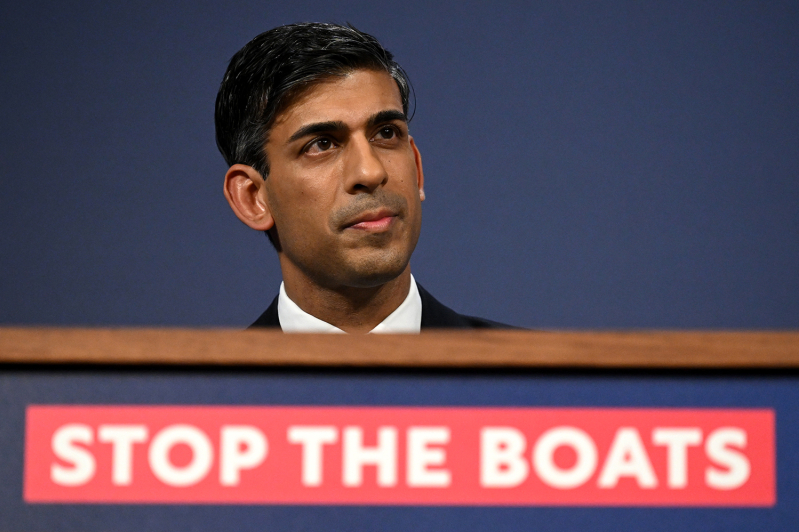
United Kingdom Prime Minister Rishi Sunak has postponed the plan to deport asylum seekers to Rwanda. Speaking during a campaign rally, Sunak said that the flights to Rwanda will commence immediately after the July 4 elections, if his Conservative Party wins the snap elections. Sunak had vowed that the flights will commence in July “come what may” even as the Labour Party pledges to reverse the policy if it takes over the government.
The plan to send asylum seekers to Rwanda had split the lower and upper chambers of parliament for months over its legality and its effectiveness to curb illegal immigration. The Rwanda bill, which sailed through on April 23 after several concessions between the two houses, was drafted to address the legal issues identified by the UK's Supreme Court.
The country’s highest court had ruled in November 2023 that Rwanda is not a safe country for asylum seekers and refugees based on its poor human rights records which would put at risk asylum seekers being forcefully returned to their home country. The Apex Court found that the plan by the U.K. government was a breach of its national and international legal obligations based on the possibility of affected persons finding themselves in the same circumstances they were escaping from.
Sunak’s government moved to parliament to amend laws that would guarantee the safety of persons relocated from the U.K. to Rwanda. With the passing of the bill, any asylum seeker who arrives in the U.K. illegally will be sent to Rwanda.
Church leaders in the United Kingdom had collectively condemned the passing of the controversial bill. In a joint statement in April, the leaders of the Anglican, Methodist, Baptist, Catholic and United Reformed Churches maintained their stance on the plan, saying churches and charities offering kindness to people fleeing war and persecution were ‘unjustly maligned for political reasons.’
“We retain deep misgivings about the Safety of Rwanda Bill…for the precedent it sets at home and for other countries in how we respond to the most vulnerable. This includes victims of modern slavery and children wrongly assessed as adults, whom we have a duty to protect,” read the statement.
The Church leaders maintained that they were in support of a system that displayed compassion, justice and transparency in handling asylum seekers and refugees.
“As leaders in Christian churches, we wish to express our profound gratitude to those who live out Jesus’s call to feed and clothe the poor, and to welcome the stranger, through their work with asylum seekers and refugees, at times in the face of opposition and prejudice,” noted the leaders.
They referred to an incident in February this year where an asylum seeker from Afghanistan carried out a chemical attack on a mother and her child in the Clapham area in London leaving them with life-changing injuries. The church had been blamed by political leaders for not doing sufficient background checks when the attacker converted to Christianity.
“In their response to the tragic attack in Clapham earlier this year, some former Home Office ministers, MPs and other commentators sought to portray churches and clergy as deliberately facilitating false asylum claims. It was for this reason, at the request of Anglican leaders, that representatives of our churches met the Home Secretary in February. When asked, neither he nor officials could provide evidence to support the allegations of widespread abuse,” said the leaders in the statement signed by seven U.K. church leaders.
The statement was co-signed by Anglican Church leaders Archbishop of Canterbury, Justin Welby, Archbishop of York, Stephen Cottrell and Bishop of Southwark, Christopher Chessun. Other signatories included Catholic Bishop’s Conference of England and Wales, Paul McAleenan who is the Bishop for Migrants and Refugees, Revd Lynn Green, General Secretary, The Baptist Union of Great Britain, Revd Dr. Tess Henry-Robinson, United Reformed Church General Assembly Moderator and Revd Gill Newton, President of the Methodist Conference.
In April 2023, 1,450 Methodist, Baptist and United Reformed church leaders under the Joint Public Issues Team (JPIT) expressed their dissatisfaction with the Illegal Migration Bill, terming the government’s proposal as “incompatible with our Christian conviction that all human beings are made in the image of God.”
Methodist Public Issues Team Leader Rev. David Hardman said that the proposals lacked compassion and basic respect for people’s dignity.
“On a practical level, they fail to see that punishing people who cross the channel in small boats without offering alternative safe routes will only cause pain and increase the backlog of people who are stuck in unfit accommodation here in the UK. Even whilst some MPs are pushing for further tightening of this cruel approach, we know that we can and must do better than this. Today we call on the government to lead the way to change by creating and implementing new safe routes by which people can come to the UK to seek sanctuary,” said Revd Hardaman in the joint statement by JPIT.
According to the UK’s Refugee Council, there were 67,337 asylum applications in 2023, a 17 percent decrease compared to the previous year. The top five countries of origin for asylum seekers were Afghanistan, Iran, India, Pakistan and Turkey.
In Africa, about 25 percent of immigrants head to Europe with an overwhelming majority moving to other African countries, states a UN report on immigration trends in Africa.
Speaking to Christian Daily International, Tom Albinson, the Founder and President of International Association For Refugees (IAFR), said international conventions protect people crossing borders due to conflict, persecution or adverse conditions.
“When an asylum seeker crosses the border and asks for asylum, they haven’t broken any law, they are exercising a human right at this point,” said Albinson.





